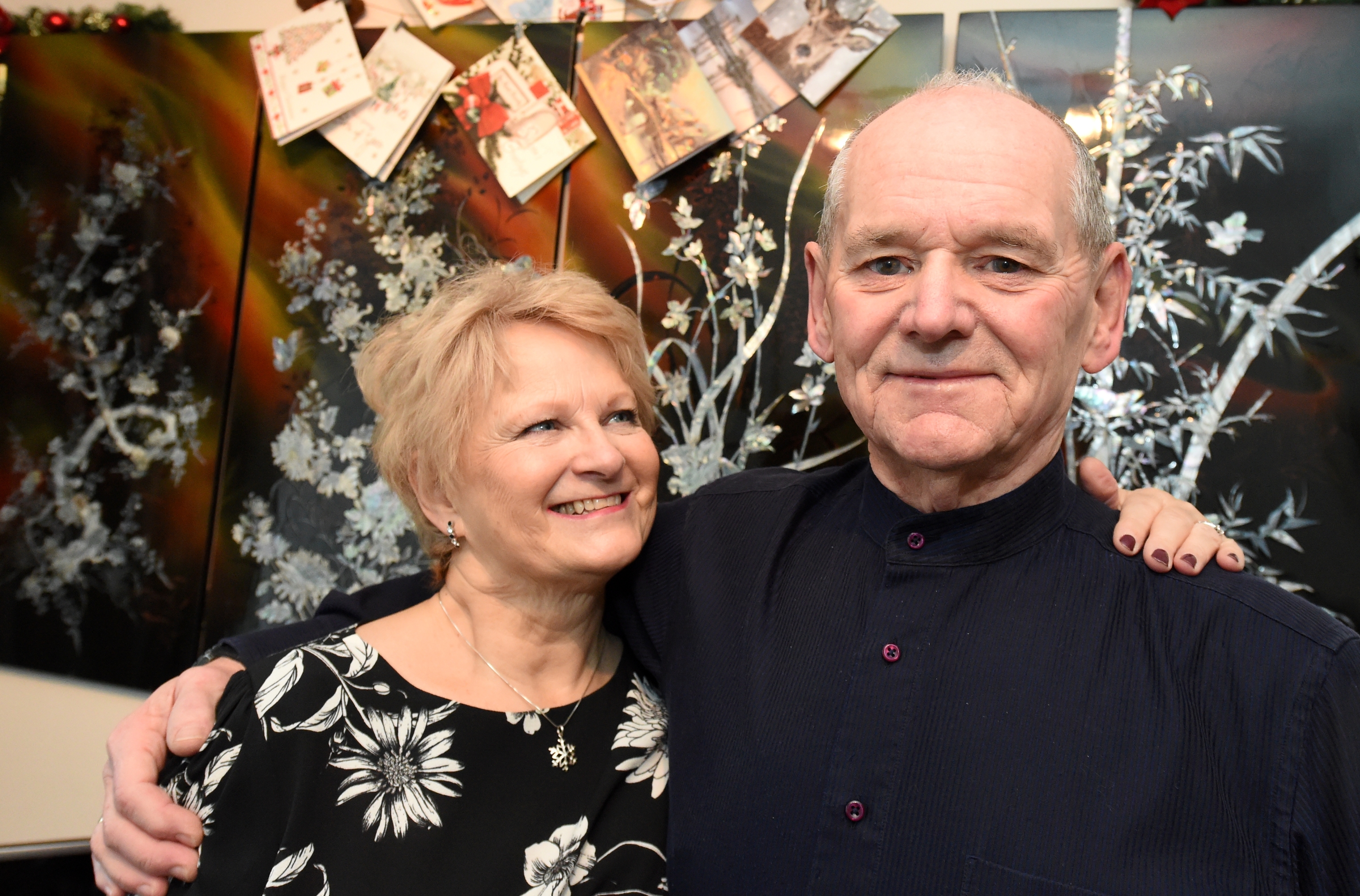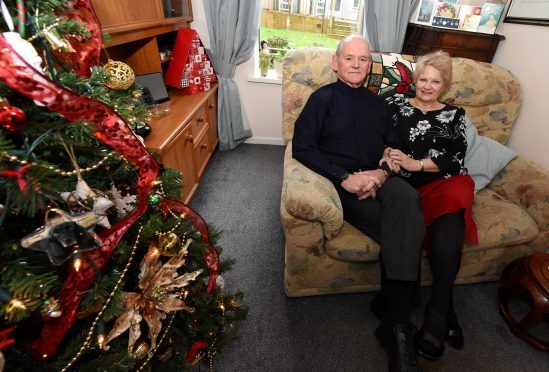Dennis Winpenny often gazes at the Vietnamese wall panels on his living room wall – where the seasons are depicted in all their fragile yet fierce beauty.
It reminds the 69-year-old grandfather of his time spent travelling the world in the oil and gas industry before he was diagnosed with Alzheimer’s four years ago.
There are good days and bad days, moments of sheer frustration and glimmers of happiness shared with Dennis’s wife of 12 years, Pamela.
The couple who live in Aberdeen are still learning to adjust to a very different life, but want fellow sufferers to know that there is always hope.
From dates to the cinema and holidays to look forward to, Dennis and Pamela have found a way forward in the face of a debilitating condition.
Alzheimer’s often develops slowly over several years and is the most common cause of dementia.
It can be difficult to distinguish from mild forgetfulness and gets worse over time.
Dennis is determined to remain upbeat about the future however and is looking forward to Christmas with the family.
“It has taken time to adjust to the diagnosis although it’s not something I dwell on anymore,” said Dennis, who has lived in Holland, Bahrain, and Norway.

“One of the hardest things was not being able to drive, I found that quite difficult but Pamela has been wonderful and drives everywhere now.
“We’ve done a few road trips and we haven’t let the diagnosis stop us from doing things together.”
Dennis enjoys spending time with his step grand-daughter and has been well supported by his family including his brother and sister, but prefers to put a brave face on his condition.
“I’m a private person and take people as I find them, I don’t tend to tell that many people that I have Alzheimer’s though,” he said.
“I think perceptions have certainly changed and people are much more aware, but men don’t really like talking about anything to do with their health.
“My condition isn’t obvious to people who don’t know me but it can feel overwhelming.
“The frustration is the worst thing but I don’t want to sit about just dwelling on the inevitable.
“We have a holiday planned for France next year and I’m putting all my energy into that.
“Even when I have a bad day I just remind myself of that trip, it’s good to have things to look forward to.”
For both Dennis and Pamela, services provided by Alzheimer Scotland Dementia Resource Centre have been a lifeline.
There are 15 support centres in Scotland and a centre opened in Aberdeen on King Street last year.
The centres are designed for people with dementia, their families and their carers, and host various events including music and art groups and football memories.
“It really has been a lifeline to be able to go there and chat to other people who are experiencing something similar,” said Dennis.
“It’s a chance to get out and Pamela and I have enjoyed many afternoons there at different events.”
The diagnosis has perhaps been more difficult for Pamela, who has had to learn to adapt to Dennis’s various moods.
“He used to be very romantic and was always doing lots of lovely things for me. The Dennis I have now is very different but there are still glimpses of the old him – his essence is still there,” she said.
“It all started off with just silly mistakes but that turned into behaviour that just wasn’t normal for him.
“He would come back from somewhere and then leave again because he had no recollection of coming home in the first place.
“He’d sit out in the garden on a cold night with no coat on and he struggled to follow instructions.”
Dennis was initially diagnosed with a cognitive impairment before he was told he did in fact have Alzheimer’s.
“We originally thought everything was going to be OK so that was tough to begin with,” said Pamela.
“It was frightening for both of us and it was quite hard to accept.
“Our relationship has changed because Dennis is different from the man I married.
“He’s a very intelligent person and it annoys me that people can be condescending to those who have dementia.”
Pamela provides hand massages for people at the centre and it also grants her a reprieve from caring for Dennis.
“Of course there are moments where I have a good cry but you have to carry on,” she said.
“The staff are very supportive and will take time to talk to you on a one-to-one basis, I have been very comforted and reassured when things have become too much for me.
“This year in particular Dennis can sometimes feel incredibly anxious when we make plans to leave the house and I worry about leaving him for a short amount of time.
“We had so many plans for our retirement. I used to think it was people in their eighties who suffered from dementia.
“We still have plans, it’s just different from what we imagined.”
The couple believe there is also a huge need for a day centre for younger dementia sufferers.
Dementia is not an inevitable part of getting older, although the likelihood of developing the condition increases with age.
In the UK, more than 40,000 people under the age of 65 have dementia, and everyone’s experience of dementia is different.
A recent campaign by Alzheimer’s Research UK has urged people to donate towards research into dementia – with a heartbreaking story narrated by Stephen Fry.
The short clip tells the story of a forgetful Santa Claus who stops delivering presents, and needs the support of his elves to help get better.
It is hoped that a treatment can be developed by 2020 that could delay the onset of dementia by five years.
This could lead to 450,000 fewer people with dementia. There are currently 90,000 people living with dementia in Scotland.
There are no treatments to stop the diseases which cause dementia, and research into the condition still only receives around 3% of the government’s medical research budget.
If you have any questions about dementia and of the services available in your area, call Alzheimer Scotland’s 24 Helpline on 0808 808 3000 or visit the website at www.alzscot.org
